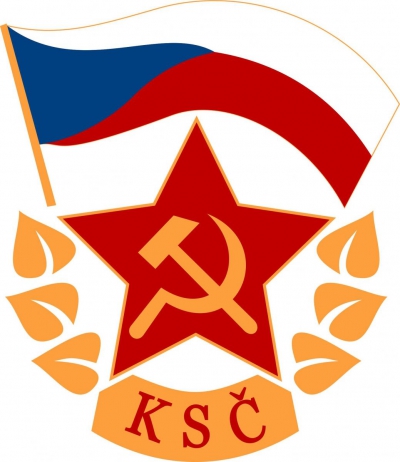In late February 1948, the Communist Party of Czechoslovakia, with Soviet backing, assumed undisputed control over the government of Czechoslovakia. It marked the onset of four decades of the party's rule in the country.The coup's significance extended well beyond the state's boundaries as it was a clear marker along the already well-advanced road to full-fledged Cold War. The event alarmed Western countries and helped spur quick adoption of the Marshall Plan, the creation of a state in West Germany, paramilitary measures to keep communists out of power in France, Greece and especially Italy, and steps toward mutual security that would, in little over a year, result in the establishment of NATO and the definitive drawing of the Iron Curtain until the Revolutions of 1989.
The Communist Party of Czechoslovakia (Czech and Slovak: Komunistická strana Československa, KSČ) was a Communist and Marxist–Leninist political party in Czechoslovakia that existed between 1921 and 1992. It was a member of the Comintern. Between 1929 and 1953, it was led by Klement Gottwald. The KSČ was the sole governing party in the Czechoslovak Socialist Republic though it was a leading party alongside with the Slovak branch and four other legally permitted non-communist parties. After its election victory in 1946, it seized power in the 1948 Czechoslovak coup d'état and established a one-party state allied with the Soviet Union. Nationalization of virtually all private enterprises followed.
The KSČ was a Communist party, based on democratic centralism, a principle conceived by Russian Marxist scholar Vladimir Lenin, which entails democratic and open discussion of policy issues within the party, followed by the requirement of total unity in upholding the agreed policies. The highest body within the KSČ was the Party Congress, which convened every five years. When the Congress was not in session, the Central Committee was the highest body. Because the Central Committee met twice a year, most day-to-day duties and responsibilities were vested in the Politburo. The party leader was the head of government and held the office of either General Secretary, Premier or head of state, or some of the three offices concurrently, but never all three at the same time.
The Party was committed to communism and held Marxism–Leninism, a fusion of the original ideas of German philosopher and economic theorist Karl Marx, and Lenin, introduced by Joseph Stalin in 1929, became formalized as the party's guiding ideology and would remain so throughout the rest of its existence. The party pursued state socialism, under which all industries were nationalized, and a command economy was implemented. In 1968, party leader Alexander Dubček proposed reforms that included a democratic process and initiated the Prague Spring; this led to the invasion of Czechoslovakia by the Soviet Union. Under pressure from the Kremlin, all reforms were repealed, party leadership became taken over by its more authoritarian wing, and a massive non-bloody purge of party members was conducted.
In 1989, the party leadership bowed to popular pressure during the Velvet Revolution and agreed to call the first contested election since 1946. In 1990, the centre-based Civic Forum won the election and the Communist Party stood down. That November, the Communist Party of Czechoslovakia became a federation of the Communist Party of Bohemia and Moravia and the Communist Party of Slovakia.
The Communist Party of Czechoslovakia was declared to be a criminal organisation in the Czech Republic by the 1993 Act on Illegality of the Communist Regime and on Resistance Against It.

1948Feb, 25
The Communist Party takes control of government in Czechoslovakia and the period of the Third Republic ends.
Choose Another Date
Events on 1948
- 3Apr
Marshall Plan
United States President Harry S. Truman signs the Marshall Plan, authorizing $5 billion in aid for 16 countries. - 14May
1948 Arab-Israeli War
Israel is declared to be an independent state and a provisional government is established. Immediately after the declaration, Israel is attacked by the neighboring Arab states, triggering the 1948 Arab-Israeli War. - 15May
1948 Arab-Israeli War
Following the expiration of The British Mandate for Palestine, the Kingdom of Egypt, Transjordan, Lebanon, Syria, Iraq and Saudi Arabia invade Israel thus starting the 1948 Arab-Israeli War. - 16Jul
1948 Arab-Israeli War
Following token resistance, the city of Nazareth, revered by Christians as the hometown of Jesus, capitulates to Israeli troops during Operation Dekel in the 1948 Arab-Israeli War. - 3Aug
Alger Hiss
Whittaker Chambers accuses Alger Hiss of being a communist and a spy for the Soviet Union.

 English
English  español
español  français
français  português
português  русский
русский  العربية
العربية  简体中文
简体中文 